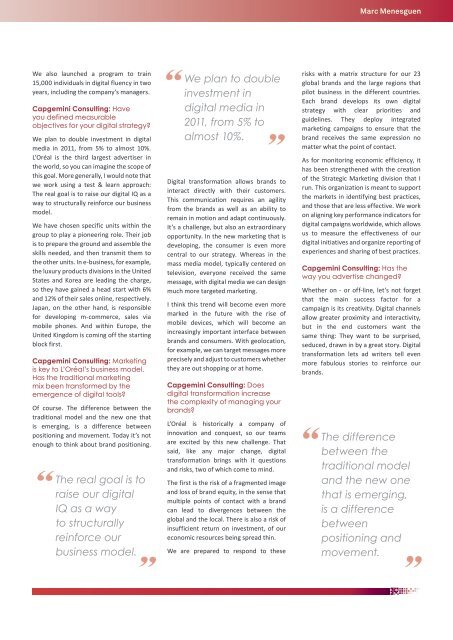Marc Menesguen
Marc Menesguen
Marc Menesguen
You also want an ePaper? Increase the reach of your titles
YUMPU automatically turns print PDFs into web optimized ePapers that Google loves.
We also launched a program to train<br />
15,000 individuals in digital fluency in two<br />
years, including the company’s managers.<br />
Capgemini Consulting: Have<br />
you defined measurable<br />
objectives for your digital strategy?<br />
We plan to double investment in digital<br />
media in 2011, from 5% to almost 10%.<br />
L’Oréal is the third largest advertiser in<br />
the world, so you can imagine the scope of<br />
this goal. More generally, I would note that<br />
we work using a test & learn approach:<br />
The real goal is to raise our digital IQ as a<br />
way to structurally reinforce our business<br />
model.<br />
We have chosen specific units within the<br />
group to play a pioneering role. Their job<br />
is to prepare the ground and assemble the<br />
skills needed, and then transmit them to<br />
the other units. In e-business, for example,<br />
the luxury products divisions in the United<br />
States and Korea are leading the charge,<br />
so they have gained a head start with 6%<br />
and 12% of their sales online, respectively.<br />
Japan, on the other hand, is responsible<br />
for developing m-commerce, sales via<br />
mobile phones. And within Europe, the<br />
United Kingdom is coming off the starting<br />
block first.<br />
Capgemini Consulting: Marketing<br />
is key to L’Oréal’s business model.<br />
Has the traditional marketing<br />
mix been transformed by the<br />
emergence of digital tools?<br />
Of course. The difference between the<br />
traditional model and the new one that<br />
is emerging, is a difference between<br />
positioning and movement. Today it’s not<br />
enough to think about brand positioning.<br />
The real goal is to<br />
raise our digital<br />
IQ as a way<br />
to structurally<br />
reinforce our<br />
business model.<br />
We plan to double<br />
investment in<br />
digital media in<br />
2011, from 5% to<br />
almost 10%.<br />
Digital transformation allows brands to<br />
interact directly with their customers.<br />
This communication requires an agility<br />
from the brands as well as an ability to<br />
remain in motion and adapt continuously.<br />
It’s a challenge, but also an extraordinary<br />
opportunity. In the new marketing that is<br />
developing, the consumer is even more<br />
central to our strategy. Whereas in the<br />
mass media model, typically centered on<br />
television, everyone received the same<br />
message, with digital media we can design<br />
much more targeted marketing.<br />
I think this trend will become even more<br />
marked in the future with the rise of<br />
mobile devices, which will become an<br />
increasingly important interface between<br />
brands and consumers. With geolocation,<br />
for example, we can target messages more<br />
precisely and adjust to customers whether<br />
they are out shopping or at home.<br />
Capgemini Consulting: Does<br />
digital transformation increase<br />
the complexity of managing your<br />
brands?<br />
L’Oréal is historically a company of<br />
innovation and conquest, so our teams<br />
are excited by this new challenge. That<br />
said, like any major change, digital<br />
transformation brings with it questions<br />
and risks, two of which come to mind.<br />
The first is the risk of a fragmented image<br />
and loss of brand equity, in the sense that<br />
multiple points of contact with a brand<br />
can lead to divergences between the<br />
global and the local. There is also a risk of<br />
insufficient return on investment, of our<br />
economic resources being spread thin.<br />
We are prepared to respond to these<br />
<strong>Marc</strong> <strong>Menesguen</strong><br />
risks with a matrix structure for our 23<br />
global brands and the large regions that<br />
pilot business in the different countries.<br />
Each brand develops its own digital<br />
strategy with clear priorities and<br />
guidelines. They deploy integrated<br />
marketing campaigns to ensure that the<br />
brand receives the same expression no<br />
matter what the point of contact.<br />
As for monitoring economic efficiency, it<br />
has been strengthened with the creation<br />
of the Strategic Marketing division that I<br />
run. This organization is meant to support<br />
the markets in identifying best practices,<br />
and those that are less effective. We work<br />
on aligning key performance indicators for<br />
digital campaigns worldwide, which allows<br />
us to measure the effectiveness of our<br />
digital initiatives and organize reporting of<br />
experiences and sharing of best practices.<br />
Capgemini Consulting: Has the<br />
way you advertise changed?<br />
Whether on - or off-line, let’s not forget<br />
that the main success factor for a<br />
campaign is its creativity. Digital channels<br />
allow greater proximity and interactivity,<br />
but in the end customers want the<br />
same thing: They want to be surprised,<br />
seduced, drawn in by a great story. Digital<br />
transformation lets ad writers tell even<br />
more fabulous stories to reinforce our<br />
brands.<br />
The difference<br />
between the<br />
traditional model<br />
and the new one<br />
that is emerging,<br />
is a difference<br />
between<br />
positioning and<br />
movement.


